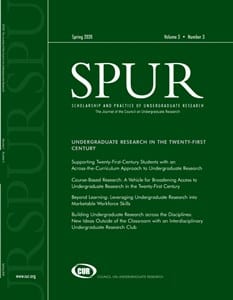SPUR (2020) 3 (3): https://doi.org/10.18833/spur/3/3/9 Abstract:
An across-the-curriculum (ATC) approach to undergraduate research (UR) is a productive addition to UR ecosystems at equity-oriented institutions. The ATC approach is differentiated from mentored UR experiences and laboratory course-based UR experiences by its ability to employ experiential, problem-based skills and practices for a broad variety of informal research activities at all levels of curriculum and without special facilities. In doing so, the ATC model encourages faculty to make the application of twenty-first-century student learning outcomes explicit for students who are new to research so that they see how inquiry, knowledge creation, and other aspects of problem-solving are used in practical ways that translate to professional and community contexts.
More Articles in this Issue
- Practice‐ Prajukti Bhattacharyya, Catherine W. M. Chan, Rocio R. Duchesne, Aditi Ghosh, Steven N. Girard, and Jonah J. Ralston
SPUR (2020) 3 (3): https://doi.org/10.18833/spur/3/3/7 Abstract:The traditional model of undergraduate research is less effective for engaging students who have little or no previous exposure to research, are unfamiliar with available research opportunities, or face financial or time constraints that prevent them from engaging in co- or extracurricular activities. Given today’s changing student demographics, models such as course-embedded research need to be explored so that undergraduate research participation may be broadened across disciplines. This article describes how a community of practitioners was created to infuse research in courses at both two- and four-year campuses, with four examples of courses with embedded research activities. Discussed are strategies for implementing discipline-specific research activities at all levels of the undergraduate curriculum to expose a broader student population to the benefits of mentored research.
- Practice‐ Kimberly J. McClure-Brenchley, Kristin Picardo, and Julia Overton-Healy
SPUR (2020) 3 (3): https://doi.org/10.18833/spur/3/3/10 Abstract:Learning outcomes can structure and enhance the undergraduate research experience, building skills such as critical thinking/problem solving, communication, and team-work/collaboration. These skills often correspond to what employers desire in their recruitment of recent college graduates: students possess career competencies that result from undergraduate research and prepare them for the workforce. However, students do not necessarily recognize the value of undergraduate research for workforce preparation, recognize how their research experience has prepared them, and/or are unable to fully articulate their preparedness. The authors discuss the value of integrating learning outcomes across the college experience to enhance undergraduate research and career readiness. They detail the implementation of an integrated model within a primarily undergraduate institution and suggest strategies to best leverage undergraduate research for workforce preparation.
- Practice‐ Alison Rios Millett McCartney, Rhiannon Rio Napoli Clements, Lauren Cahalan, Kai Johnson, and Bethany Pace
SPUR (2020) 3 (3): https://doi.org/10.18833/SPUR/3/3/11 Abstract:One often overlooked challenge of undergraduate research (UR) is access to information. Growing student diversity, including first-generation students, and increasing calls for a better-trained workforce suggest that higher education should be providing more support for UR. The authors propose that higher education needs cost-effective, impactful ways to advance UR initiatives. At Towson University, an interdisciplinary Undergraduate Research Club was created to foster a culture of peer-mentored undergraduate research. The authors review the creation of this club; explain goals, activities, and structure; and provide supporting data for activities, including the fund-raising activity Research Grams. This model offers a valuable, replicable, low-cost tool to advance accessible, student-centered undergraduate research initiatives.
- Vignette‐ Nicholas J. Rowland and Matthew J. Spaniol
SPUR (2020) 4 (1): https://doi.org/10.18833/spur/3/3/6 - Article‐ Emily K. Faulconer, John Griffith, Zachary Dixon, and Donna Roberts
SPUR (2020) 3 (3): https://doi.org/10.18833/spur/3/3/1 Abstract:Undergraduate research benefits students by strengthening skills, providing professional growth, and improving retention. Yet significant barriers exist, including low awareness of opportunities, restrictive cultural norms, and resource constraints. The proliferation of online education potentially increases barriers, both real and perceived. This study compared participation rates and perceived barriers between undergraduate distance and traditional students. Survey results indicated no significant differences in self-reported participation or overall interest in research. Despite inherent structural limitations of online education, there were no significant differences in the respondents’ perceptions of access to opportunities, physical resources, or human resources. Significant differences were seen regarding awareness of research opportunities. Although institution-specific moderating factors may influence results, this information is valuable for strategic planning aimed at increasing opportunities and awareness for undergraduates.


